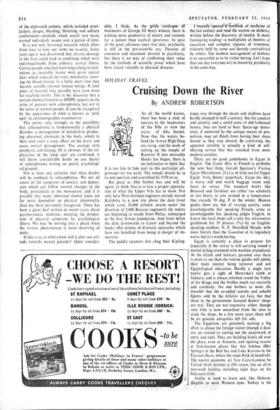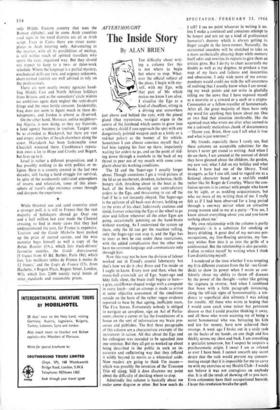HOLIDAY TRAVEL
Cruising Down the River
By ANDREW ROBERTSON
But great as Abu Simbel was and will be again, to think thus is to lose a proper apprecia- tion of what the Upper Nile has to show. Not only have West German engineers already moved Kalabsha to a new site above the dam (over which some 30,000 fellahin swarm under the direction of 2,000 Russian engineers), the waters are beginning to recede from Philae, submerged in the first Aswan inundation. And from• below the dam downwards to Luxor and beyond the banks offer dozens of dramatic spectacles.which have not benefited from being in danger of im- mersion.
The paddle steamers that chug their Kipling- esque way through the shoals and shallows have hardly changed in half a century. But for comfort and serenity, and a sinful sense of old-fashioned luxury, they are hard to beat. Space-age demo- crats, if unmoved by the antique means of pro- pulsion, may yet flinch from having their shoes dusted as they step aboard. Be comforted, the apparent servility is actually a kind of self- effacing service that has vanished from more modern societies.
There are no good guidebooks to Egypt in English. The Guide Bleu in French is probably the next best thing. Gerald Sparrow's Visiting Egypt (Hutchinson, 21s.) is of little use for Upper Egypt. Vista Books' paperback, Egypt (6s. 6d.), is worse still and worth baggage room only Iante de mieux. The standard works like Breasted and Gardiner are either too scholarly or too heavy to tote around in a temperature that exceeds 70 deg. F in the winter. Human guides there are, but of varying quality, some knowledgeable but speaking French, some as knowledgeable but speaking pidgin English. In Luxor the local shops sell a tatty but informative guidebook for 35 piastres (7s.) by an English- Speaking resident, N. F. Mansfield Meade, with more literals than the Guardian at its legendary worst, but it is worth having.
Egypt is certainly a place to prepare for (especially if the visitor is still carrying round a mental kitbag crammed with wartime prejudices). At the Gizeh and Sakkara pyramid sites there is more to see than the routine guides will admit, their main interest being turnover and not Egyptological education. Hardly a single tyro tourist gets a sight of Mereroka's tomb at Sakkara, and is always whisked round the Valley of the Kings and the Nobles much too cursorily and carelessly. No one bothers to warn the traveller that the so-called scarabs and ushabti figures sold by the fellahin are fake, but that those in the government licensed dealers' shops are real. They are not expensive, either, though very little is now unearthed from the sites to stock the shops. In a few more years there will be no genuine antiquities left for sale.
The Egyptians are genuinely making a big effort to please the foreign visitor (though it does not yet extend to cutting out the paperwork at entry and exit). They are building hotels all over the place, even at Alamein, and opening resorts at little-known places like Ain Sokhna (Hot Springs) in the Red Sea and Lake Karoun in the Fayoum Oasis, where the snipe flock in hundreds. The tourist economy air fare Cairo-London by United Arab Airlines is £96 return, but an all-in two-week holiday including eight days on the Nile costs £145.
Arabic is hard to learn and, like Hebrew, illegible to most Western eyes. Turkey is the only Middle Eastern country that uses the Roman alphabet, and in some Arab countries road signs in the rural districts are all in Arab script. Even in Cairo there are street name- plates in Arab lettering only. Adventuring in the interior, with all its possibilities of mishap, is still within reach of spirited travellers who spurn the easy, organised way. But they should not expect to keep to a two- or three-week schedule. Where the language is a partial mystery, mechanical skills are rare, and urgency unknown, short-termed tourists are well advised to rely on the professionals.
There are now nearly twenty agencies hand- ling Middle East and North African holidays from Britain, and as the sunseekers' circle widens no ambitious agent dare neglect the semi-desert fringe and the once fertile crescent. Incidentally, Iraq does not seem to figure much in these de- velopments, and Jordan is almost as ill-served.
On the other hand, Morocco, unlike neighbour- ing Algeria, is now doing, as they say Stateside, a land agency business in tourism. Tangier can be as crowded as Blackpool, but there are vast and empty stretches of beach elsewhere along the coast. Marrakesh has been fashionable since Churchill wintered there. Casablanca's reputa- tion owes a lot to Hope and Crosby and Bogart, but lives up to it.
Israel is rather a different proposition, and it has possibly nothing to do with politics or re- ligion. Here is a country created in the last two decades, still facing a hard struggle for survival. In spite of the assiduously cultivated atmosphere of resorts and relaxation, some of this atmo- sphere of razor's edge existence comes through and sharpens the experience.



































 Previous page
Previous page